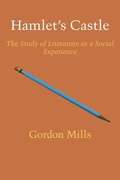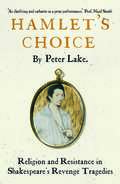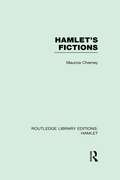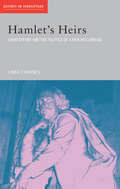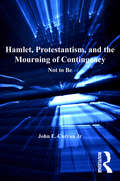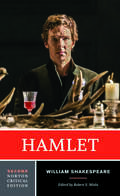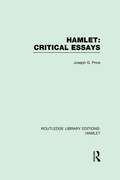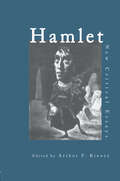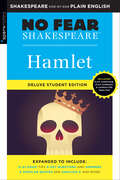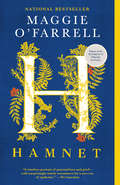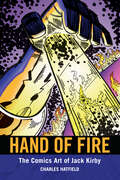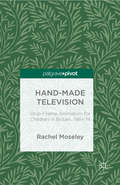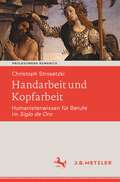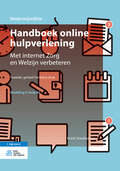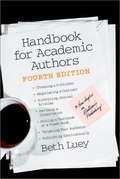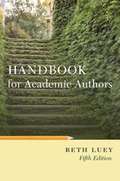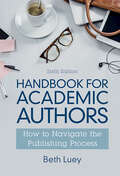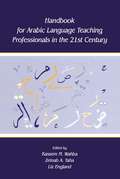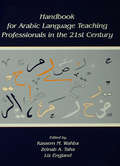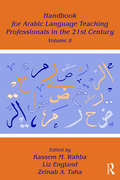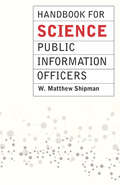- Table View
- List View
Hamlet's Castle: The Study of Literature as a Social Experience
by Gordon MillsHamlet's Castle is both a theoretical and a practical examination of the interactions that take place in a literary classroom. The book traces the source of literature's power to the relationship between its illusional quality and its abstract meaning and relates these elements to the process by which a group, typically an academic class, forms a judgment about a literary work. In focusing on the importance of the exchange of ideas by readers, Gordon Mills reveals a new way of looking at literature as well as a different concept of the social function of the literary classroom and the possible application of this model to other human activities. The three fundamental elements that constitute Mills's schema are the relationship between a reader and the illusional quality of literature, the relationship between a reader and the meaning of a text, and the concept of social experience within the environment of a text. The roles of illusion and meaning in a text are explored in detail and are associated with areas outside literature, including science and jurisprudence. There is an examination of the way in which decisions are forced by peers upon one another during discussion of a literary work-an exchange of opinion which is commonly a source of pleasure and insight, sought for its own sake. In the course of his study, Mills shows that the act of apprehending a literary structure resembles that of apprehending a social structure. From this relationship, he derives the social function of the literary classroom. In combining a theoretical analysis with the practical objective of determining what value can be found in the study of literature by groups of people, Mills has produced a critical study of great significance. Hamlet's Castle will change concepts about the purpose of teaching literature, affect the way in which literature is taught, and become involved in the continuing discussion of the relationship of literary studies to other disciplines. Hamlet's Castle is both a theoretical and a practical examination of the interactions that take place in a literary classroom. The book traces the source of literature's power to the relationship between its illusional quality and its abstract meaning and relates these elements to the process by which a group, typically an academic class, forms a judgment about a literary work. In focusing on the importance of the exchange of ideas by readers, Gordon Mills reveals a new way of looking at literature as well as a different concept of the social function of the literary classroom and the possible application of this model to other human activities. The three fundamental elements that constitute Mills's schema are the relationship between a reader and the illusional quality of literature, the relationship between a reader and the meaning of a text, and the concept of social experience within the environment of a text. The roles of illusion and meaning in a text are explored in detail and are associated with areas outside literature, including science and jurisprudence. There is an examination of the way in which decisions are forced by peers upon one another during discussion of a literary work-an exchange of opinion which is commonly a source of pleasure and insight, sought for its own sake. In the course of his study, Mills shows that the act of apprehending a literary structure resembles that of apprehending a social structure. From this relationship, he derives the social function of the literary classroom. In combining a theoretical analysis with the practical objective of determining what value can be found in the study of literature by groups of people, Mills has produced a critical study of great significance. Hamlet's Castle will change concepts about the purpose of teaching literature, affect the way in which literature is taught, and become involved in the continuing discussion of the relationship of literary studies to other disciplines.
Hamlet's Choice: Religion and Resistance in Shakespeare's Revenge Tragedies
by Peter LakeAn illuminating account of how Shakespeare worked through the tensions of Queen Elizabeth&’s England in two canon-defining plays Conspiracies and revolts simmered beneath the surface of Queen Elizabeth&’s reign. England was riven with tensions created by religious conflict and the prospect of dynastic crisis and regime change. In this rich, incisive account, Peter Lake reveals how in Titus Andronicus and Hamlet Shakespeare worked through a range of Tudor anxieties, including concerns about the nature of justice, resistance, and salvation. In both Hamlet and Titus the princes are faced with successions forged under questionable circumstances and they each have a choice: whether or not to resort to political violence. The unfolding action, Lake argues, is best understood in terms of contemporary debates about the legitimacy of resistance and the relation between religion and politics. Relating the plays to their broader political and polemical contexts, Lake sheds light on the nature of revenge, resistance, and religion in post-Reformation England.
Hamlet's Fictions (Routledge Library Editions: Hamlet)
by Maurice Charney"But in a fiction, in a dream of passion..." In an extended commentary on this passage this book offers a rationale for the excellence and primacy of this play among the tragedies. Throughout, emphasis is placed on Hamlet's fantasies and imaginations rather than on ethical criteria, and on the depiction of Hamlet as a revenge play through an exploration of its dark and mysterious aspects. The book stresses the importance of Passion and Its Fictions in the play and attempts to explore the very Pirandellian topic of Hamlet's passion and dream of passion. It goes on to examine the organization of dramatic energies in the play - the use Shakespeare makes of analogy and infinite regress and of scene rows, broken scenes and impacted scenes, and the significance of the exact middle of Hamlet. The final section is devoted to conventions of style, imagery, and genre in the play - what is the stage situation of asides, soliloguies, and offstage speech? How is the imagery of skin disease and sealing distinctive? In what sense is Hamlet a comedy, or does it use comedy significantly?
Hamlet's Heirs: Shakespeare and The Politics of a New Millennium (Accents on Shakespeare)
by Linda CharnesSpeaking to readers in a voice that is adventurous rather than authoritative, innovative rather than institutional and speculative rather than orthodox, Linda Charnes’ provocative study of Shakespeare’s legacy in contemporary American and British politics explores the following themes: namesake princes and presidents stolen thrones and elections plutocrats and insurgents campaign trails and war-mongering waning monarchy and imperilled democracy revengers, early modern and postmodern. Linked by focused readings of Hamlet and the Henriad, the essays follow Shakespeare’s two most famous royal sons, the Princes Hamlet and Hal, as they haunt contemporary political psychology in the early years of a new millennium, and especially in the aftermath of September 11, 2001. Between devolution in Britain and the new ‘doctrine’ of pre-emptive strike in the United States, our contemporary Hamlets and Hals epitomize a debate – as fraught now as in Shakespeare’ day – about the cost of spin-doctoring legacies. In exploring how current political culture inherits Shakespeare, Hamlet’s Heirs challenges scholarly assumptions about historical periodicity, modernity and the uses of Shakespeare in present day contexts.
Hamlet, Protestantism, and the Mourning of Contingency: Not to Be
by John E. JrBuilding on current scholarly interest in the religious dimensions of the play, this study shows how Shakespeare uses Hamlet to comment on the Calvinistic Protestantism predominant around 1600. By considering the play's inner workings against the religious ideas of its time, John Curran explores how Shakespeare portrays in this work a completely deterministic universe in the Calvinist mode, and, Curran argues, exposes the disturbing aspects of Calvinism. By rendering a Catholic Prince Hamlet caught in a Protestant world which consistently denies him his aspirations for a noble life, Shakespeare is able in this play, his most theologically engaged, to delineate the differences between the two belief systems, but also to demonstrate the consequences of replacing the old religion so completely with the new.
Hamlet: A Norton Critical Edition (Norton Critical Editions #0)
by William Shakespeare“A perfect volume to initiate majors into the discipline and delight of carefully examining presumptions, priorities, language, and structures of both primary and secondary texts.” —Stephen R. Honeygosky, University of Pittsburgh This Norton Critical Edition includes: • The Second Quarto text, edited by Robert S. Miola and accompanied by his footnotes, headnotes, and introductory materials. • Eighteen illustrations from 1604 to 2008, three of them new to the Second Edition. • The Actors’ Gallery, presenting actors—from Sarah Bernhardt and Ellen Terry to Kenneth Branagh and David Tennant, two of them new to the Second Edition—reflecting on their roles in major productions of Hamlet. • Seventeen critical interpretations, representing a wide range of historical and scholarly commentary. • Afterlives, featuring fifteen reflections on Hamlet—from David Garrick and Mark Twain to Margaret Atwood and Jawad al-Assadi. • A Bibliography of print and online resources. About the Series Read by more than 12 million students over fifty-five years, Norton Critical Editions set the standard for apparatus that is right for undergraduate readers. The three-part format—annotated text, contexts, and criticism—helps students to better understand, analyze, and appreciate the literature, while opening a wide range of teaching possibilities for instructors. Whether in print or in digital format, Norton Critical Editions provide all the resources students need.
Hamlet: Critical Essays (Routledge Library Editions: Hamlet)
by Joseph G. PriceA comprehensive collection of the best writing about this Shakespearian play, both as dramatic literature and theatrical performance, this book is an excellent resource companion to the text. This collected wisdom was originally published in 1986. It contains pieces of commentary from as far back as the late 18th Century but also highly acclaimed critical pieces from more recent years, organised into six general themes.
Hamlet: Critical Essays (Shakespeare Criticism)
by Arthur F. KinneyUsing a variety of approaches, from postcolonialism and New Historicism to psychoanalysis and gender studies, the international contributors to Hamlet: New Critical Essays contribute major new interpretations on the conception and writing, editing, and cultural productions of Hamlet. This book is the most up-to-date and comprehensive critical analysis available of one of Shakespeare's best-known and most engaging plays.
Hamlet: No Fear Shakespeare Deluxe Student Editions - Shakespeare Side-by-Side Plain English (No Fear Shakespeare)
by William Shakespeare SparkNotesShakespeare everyone can understand—now in this new EXPANDED edition of HAMLET! Why fear Shakespeare? By placing the words of the original play next to line-by-line translations in plain English, this popular guide makes Shakespeare accessible to everyone. And now it features expanded literature guide sections that help students study smarter. The expanded sections include: Five Key Questions: Five frequently asked questions about major moments and characters in the play. What Does the Ending Mean?: Is the ending sad, celebratory, ironic . . . or ambivalent? Plot Analysis: What is the play about? How is the story told, and what are the main themes? Why do the characters behave as they do? Study Questions: Questions that guide students as they study for a test or write a paper. Quotes by Theme: Quotes organized by Shakespeare&’s main themes, such as love, death, tyranny, honor, and fate. Quotes by Character: Quotes organized by the play&’s main characters, along with interpretations of their meaning.
Hamnet and Judith: A novel
by Maggie O'Farrell"Remarkable . . . will leave you shaking with loss but also the love from which family is spun." Emma Donoghue, author of Room"Without a doubt one of the best novels I've ever read." Mary Beth Keane, author of Ask Again, YesTWO EXTRAORDINARY PEOPLE. A LOVE THAT DRAWS THEM TOGETHER. A PLAGUE THAT THREATENS TO TEAR THEM APART.England, 1580. A young Latin tutor--penniless, bullied by a violent father--falls in love with an eccentric young woman: a wild creature who walks her family's estate with a falcon on her shoulder and is known throughout the countryside for her unusual gifts as a healer. Agnes understands plants and potions better than she does people, but once she settles on the Henley Street in Stratford she becomes a fiercely protective mother and a steadfast, centrifugal force in the life of her young husband. His gifts as a writer are just beginning to awaken when their beloved twins, Hamnet and Judith, are afflicted with the bubonic plague, and, devastatingly, one of them succumbs to the illness.A luminous portrait of a marriage, a shattering evocation of a family ravaged by grief and loss, and a hypnotic recreation of the story that inspired one of the greatest literary masterpieces of all time, Hamnet & Judith is mesmerizing and seductive, an impossible-to-put-down novel from one of our most gifted writers.
Hampton-Brown Edge Reading Writing and Language
by Michael W. Smith Deborah J. Short David W. Moore Alfred W. Tatum"6 units, each organized around a motivating Essential Question. Focused, in-depth instruction in reading strategies and literary analysis. Relevant literature that students can and want to read. Scaffolded, real-world writing projects.
Hampton-Brown edgeTM Reading, Writing & Language [Grade 9-12]
by Michael W. Smith Deborah J. Short David W. MooreNIMAC-sourced textbook
Hand of Fire: The Comics Art of Jack Kirby (Great Comics Artists Series)
by Charles HatfieldJack Kirby (1917–1994) is one of the most influential and popular artists in comics history. With Stan Lee, he created the Fantastic Four and defined the drawing and narrative style of Marvel Comics from the 1960s to the present day. Kirby is credited with creating or cocreating a number of Marvel's mainstay properties, among them the X-Men, the Hulk, Thor, and the Silver Surfer. His earlier work with Joe Simon led to the creation of Captain America, the popular kid gang and romance comic genres, and one of the most successful comics studios of the 1940s and 1950s. Kirby's distinctive narrative drawing, use of bold abstraction, and creation of angst-ridden and morally flawed heroes mark him as one of the most influential mainstream creators in comics. In this book, Charles Hatfield examines the artistic legacy of one of America's true comic book giants. He analyzes the development of Kirby's cartooning technique, his use of dynamic composition, the recurring themes and moral ambiguities in his work, his eventual split from Lee, and his later work as a solo artist. Against the backdrop of Kirby's earlier work in various genres, Hand of Fire examines the peak of Kirby's career, when he introduced a new sense of scope and sublimity to comic book fantasy.
Hand-Made Television: Stop-Frame Animation for Children in Britain, 1961-1974
by R. MoseleyHand-Made Television explores the ongoing enchantment of many of the much-loved stop-frame children's television programmes of 1960s and 1970s Britain. The first academic work to analyse programmes such as Pogles' Wood (1966), Clangers (1969), Bagpuss (1974) (Smallfilms) and Gordon Murray's Camberwick Green (1966), Trumpton (1967) and Chigley (1969), the book connects these series to their social and historical contexts while providing in-depth analyses of their themes and hand-made aesthetics. Hand-Made Television shows that the appeal of these programmes is rooted not only in their participatory address and evocation of a pastoral English past, but also in the connection of their stop-frame aesthetics to the actions of childhood play. This book makes a significant contribution to both Animation Studies and Television Studies; combining scholarly rigour with an accessible style, it is suitable for scholars as well as fans of these iconic British children's programmes.
Handarbeit und Kopfarbeit: Humanistenwissen für Berufe im Siglo de Oro (Prolegomena Romanica. Beiträge zu den romanischen Kulturen und Literaturen)
by Christoph StrosetzkiIn der frühen Neuzeit beschäftigen sich zahlreiche Texte mit Berufen, indem sie das jeweils erforderliche Wissen, einzelne Aufgabenfelder, Zweck, Ursprung und Prestige darstellen. Humanistisch ist der Argumentationsgang, insofern er meist vom Menschen ausgeht. Prägend ist dabei die antike Vorstellung vom Vorrang der Kopfarbeit vor der Handarbeit. Die Bedeutung Spaniens ergibt sich daraus, dass der spanische König Karl V. zugleich Kaiser und Herrscher über die Kolonien in Amerika war, also nach damaligen Verhältnissen ein Weltreich regierte. Nach der Erörterung einiger zentraler Kategorien werden Gesamtdarstellungen des Wissens, der Berufe und der herausragenden Berufsvertreter vorgestellt. Dabei ist die Hierarchisierung und deren Relativierung durch die Satire aufschlussreich. Anhand einzelner als charakteristische Beispiele ausgewählter Berufe mit jeweiligem spezifischen Wissen werden dann die mechanischen Künste und die artes liberales vorgeführt. Den Abschluss bilden die höheren Fakultäten Medizin, Theologie und Jurisprudenz mit ihren Vertretern.
Handboek online hulpverlening: Met internet Zorg en Welzijn verbeteren
by Frank SchalkenDeze Onderwijseditie bestaat uit: Deel I OriëntatieDeel II UitvoeringToegankelijkheid, kwaliteit en gebruikersgemak verbeteren, regie en zelfredzaamheid stimuleren en kosten besparen: hulpverlening via internet verbetert hulp bij psychische, sociale of maatschappelijke problemen. Steeds meer organisaties bieden dan ook online hulp. Wat maakt hulpverlening via internet zo waardevol? Wat is nodig voordat een instelling online hulp (grootschalig) kan aanbieden?Het Handboek online hulpverlening (onderwijseditie) is tot stand gekomen op basis van meer dan tien jaar ervaring met online hulpverlening en bevat alle relevante aspecten van dit vakgebied. Deze geheel vernieuwde editie beschrijft alle nieuwe ontwikkelingen en actuele inzichten omtrent wetenschappelijk onderzoek, blended hulpverlening, mHealth, therapietrouw, leerstijlen én de zeven kenmerken van een competente online hulpverlener. Naast een uitgebreide beschrijving van de methodiek komen de kenmerken, voor- en nadelen en verschillende online hulpvormen aan bod. Door het hele boek heen staan voorbeelden van bestaande onlineen blended interventies.Dit handboek is zowel geschikt voor studenten die zich oriënteren op online hulpverlening als voor onderwijsinstellingen die hun online hulp aanbod willen uitbreiden of verbeteren.
Handbook for Academic Authors
by Beth LueyChoosing a publisher, negotiating a contract, submitting journal articles, revising a dissertation, writing a textbook, targeting your audience, publishing electronically.
Handbook for Academic Authors
by Beth LueyWhether you are a graduate student seeking to publish your first article, a new Ph.D. revising your dissertation for publication, or an experienced author working on a new monograph, textbook, or digital publication, Handbook for Academic Authors provides reliable, concise advice about selecting the best publisher for your work, maintaining an optimal relationship with your publisher, submitting manuscripts to book and journal publishers, working with editors, navigating the production process, and helping to market your book. It also offers information about illustrations, indexes, permissions, and contracts and includes a chapter on revising dissertations and one on the financial aspects of publishing. The book covers not only scholarly monographs but also textbooks, anthologies, multiauthor books, and trade books. The fifth edition has been revised and updated to align with new technological and financial realities, taking into account the impact of digital technology and the changes it has made in authorship and publishing.
Handbook for Academic Authors
by Beth LueyWhether you are a graduate student seeking to publish your first article, a new Ph. D. revising your dissertation for publication, or an experienced author working on a new monograph, textbook, or digital publication, Handbook for Academic Authors provides reliable, concise advice about selecting the best publisher for your work, maintaining an optimal relationship with your publisher, submitting manuscripts to book and journal publishers, working with editors, navigating the production process, and helping to market your book. It also offers information about illustrations, indexes, permissions, and contracts and includes a chapter on revising dissertations and one on the financial aspects of publishing. The book covers not only scholarly monographs but also textbooks, anthologies, multiauthor books, and trade books. The fifth edition has been revised and updated to align with new technological and financial realities, taking into account the impact of digital technology and the changes it has made in authorship and publishing.
Handbook for Academic Authors: How to Navigate the Publishing Process
by Beth LueyWhether you are a faculty member, a librarian, an independent scholar, the junior member of a research team, or a writer outside academia, Handbook for Academic Authors will help you select the right publisher, submit a winning proposal, negotiate a favorable contract, and work with your editor to ensure your research reaches the largest possible audience. The book provides advice on writing for different audiences and managing the mechanics of authorship, including manuscript preparation, acquiring illustrations, proofreading, and indexing. To address the major changes in scholarly publishing over the last decade, the sixth edition has been revised and updated to include discussions about open access and digital publishing, the use of social media as a marketing tool, changes within academia, and concerns of new entrants into academia. Written in a personalized, accessible style, Handbook for Academic Authors offers sound advice and encouragement to a wide range of aspiring academic authors.
Handbook for Arabic Language Teaching Professionals in the 21st Century
by Kassem M. Wahba Liz England Zeinab A. TahaThis landmark volume offers an introduction to the field of teaching Arabic as a foreign or second language. Recent growth in student numbers and the demand for new and more diverse Arabic language programs of instruction have created a need that has outpaced the ability of teacher preparation programs to provide sufficient numbers of well-qualified professional teachers at the level of skill required. Arabic language program administrators anticipate that the increases in enrollment will continue into the next decades. More resources and more varied materials are seriously needed in Arabic teacher education and training. The goal of this Handbook is to address that need.The most significant feature of this volume is its pioneer role in approaching the field of Arabic language teaching from many different perspectives. It offers readers the opportunity to consider the role, status, and content of Arabic language teaching in the world today. The Handbook is intended as a resource to be used in building Arabic language and teacher education programs and in guiding future academic research. Thirty-four chapters authored by leaders in the field are organized around nine themes:*Background of Arabic Language Teaching;*Contexts of Arabic Language Teaching;*Communicative Competence in Arabic;*The Learners;*Assessment;*Technology Applications;*Curriculum Development, Design, and Models;*Arabic Language Program Administration and Management; and*Planning for the Future of Arabic Language Learning and Teaching.The Handbook for Arabic Language Teaching Professionals in the 21st Century will benefit and be welcomed by Arabic language teacher educators and trainers, administrators, graduate students, and scholars around the world. It is intended to create dialogue among scholars and professionals in the field and in related fields--dialogue that will contribute to creating new models for curriculum and course design, materials and assessment tools, and ultimately, better instructional effectiveness for all Arabic learners everywhere, in both Arabic-speaking and non-Arabic speaking countries.
Handbook for Arabic Language Teaching Professionals in the 21st Century
by Kassem M. Wahba Liz England Zeinab A. TahaThis landmark volume offers an introduction to the field of teaching Arabic as a foreign or second language. Recent growth in student numbers and the demand for new and more diverse Arabic language programs of instruction have created a need that has outpaced the ability of teacher preparation programs to provide sufficient numbers of well-qualified professional teachers at the level of skill required. Arabic language program administrators anticipate that the increases in enrollment will continue into the next decades. More resources and more varied materials are seriously needed in Arabic teacher education and training. The goal of this Handbook is to address that need.The most significant feature of this volume is its pioneer role in approaching the field of Arabic language teaching from many different perspectives. It offers readers the opportunity to consider the role, status, and content of Arabic language teaching in the world today. The Handbook is intended as a resource to be used in building Arabic language and teacher education programs and in guiding future academic research. Thirty-four chapters authored by leaders in the field are organized around nine themes: Background of Arabic Language Teaching; Contexts of Arabic Language Teaching; Communicative Competence in Arabic; The Learners; Assessment; Technology Applications; Curriculum Development, Design, and Models; Arabic Language Program Administration and Management; and Planning for the Future of Arabic Language Learning and Teaching. The Handbook for Arabic Language Teaching Professionals in the 21st Century will benefit and be welcomed by Arabic language teacher educators and trainers, administrators, graduate students, and scholars around the world. It is intended to create dialogue among scholars and professionals in the field and in related fields--dialogue that will contribute to creating new models for curriculum and course design, materials and assessment tools, and ultimately, better instructional effectiveness for all Arabic learners everywhere, in both Arabic-speaking and non-Arabic speaking countries.
Handbook for Arabic Language Teaching Professionals in the 21st Century, Volume II
by Kassem M. Wahba Liz England Zeinab A. TahaDrawing on the collective expertise of language scholars and educators in a variety of subdisciplines, the Handbook for Arabic Language Teaching Professionals in the 21st Century, Volume II, provides a comprehensive treatment of teaching and research in Arabic as a second and foreign language worldwide. Keeping a balance among theory, research and practice, the content is organized around 12 themes: Trends and Recent Issues in Teaching and Learning Arabic Social, Political and Educational Contexts of Arabic Language Teaching and Learning Identifying Core Issues in Practice Language Variation, Communicative Competence and Using Frames in Arabic Language Teaching and Learning Arabic Programs: Goals, Design and Curriculum Teaching and Learning Approaches: Content-Based Instruction and Curriculum Arabic Teaching and Learning: Classroom Language Materials and Language Corpora Assessment, Testing and Evaluation Methodology of Teaching Arabic: Skills and Components Teacher Education and Professional Development Technology-Mediated Teaching and Learning Future Directions The field faces new challenges since the publication of Volume I, including increasing and diverse demands, motives and needs for learning Arabic across various contexts of use; a need for accountability and academic research given the growing recognition of the complexity and diverse contexts of teaching Arabic; and an increasing shortage of and need for quality of instruction. Volume II addresses these challenges. It is designed to generate a dialogue—continued from Volume I—among professionals in the field leading to improved practice, and to facilitate interactions, not only among individuals but also among educational institutions within a single country and across different countries.
Handbook for Science Public Information Officers
by W. Matthew ShipmanWhether sharing a spectacular shot from a deep-space probe, announcing a development in genetic engineering, or crafting an easy-to-reference list of cancer risk factors, science public information officers, or PIOs, serve as scientific liaisons, connecting academic, nonprofit, government, and other research organizations with the public. And as traditional media outlets cut back on their science coverage, PIOs are becoming a vital source for science news. W. Matthew Shipman’s Handbook for Science Public Information Officers covers all aspects of communication strategy and tactics for members of this growing specialty. It includes how to pitch a story, how to train researchers to navigate interviews, how to use social media effectively, and how to respond to a crisis. The handbook offers a wealth of practical advice while teaching science PIOs how to think critically about what they do and how they do it, so that they will be prepared to take advantage of any situation, rather than being overwhelmed by it. For all science communicators—whether they’re starting their careers, crossing over from journalism or the research community, or professional communicators looking to hone their PIO skills—Shipman’s Handbook for Science Public Information Officers will become their go-to reference.
Handbook for Science Public Information Officers
by W. Matthew SimpsonWhether sharing a spectacular shot from a deep-space probe, announcing a development in genetic engineering, or crafting an easy-to-reference list of cancer risk factors, science public information officers, or PIOs, serve as scientific liaisons, connecting academic, nonprofit, government, and other research organizations with the public. And as traditional media outlets cut back on their science coverage, PIOs are becoming a vital source for science news. W. Matthew Shipman's Handbook for Science Public Information Officers covers all aspects of communication strategy and tactics for members of this growing specialty. It includes how to pitch a story, how to train researchers to navigate interviews, how to use social media effectively, and how to respond to a crisis. The handbook offers a wealth of practical advice while teaching science PIOs how to think critically about what they do and how they do it, so that they will be prepared to take advantage of any situation, rather than being overwhelmed by it. For all science communicators--whether they're starting their careers, crossing over from journalism or the research community, or professional communicators looking to hone their PIO skills--Shipman's Handbook for Science Public Information Officers will become their go-to reference.
